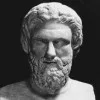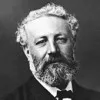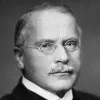Give not thy Enemy Despair; for it is a weapon more dangerous than Valour it self.
Thomas Fuller (1654-1734) English physician, preacher, aphorist, writer
Introductio ad Prudentiam, Vol. 1, # 531 (1725)
(Source)
Quotations about:
enemy
Note not all quotations have been tagged, so Search may find additional quotes on this topic.
Instinctively we divide mankind into friends and foes — friends, towards whom we have the morality of co-operation; foes, towards whom we have that of competition. But this division is constantly changing; at one moment a man hates his business competitor, at another, when both are threatened by Socialism or by an external enemy, he suddenly begins to view him as a brother. Always when we pass beyond the limits of the family it is the external enemy which supplies the cohesive force. In times of safety we can afford to hate our neighbour, but in times of danger we must love him.
Bertrand Russell (1872-1970) English mathematician and philosopher
Authority and the Individual, Lecture 1 (1949)
(Source)
Collection, with some edits, of the inaugural Reith Lectures, BBC, "Authority and the Individual," No. 1 "Social Cohesion and Human Nature" [14:16] (1948-12-26).
That man must be everyone’s personal enemy who has behaved like a public enemy to his own friends. No wise man ever felt that a traitor ought to be trusted.
[Omnium est communis inimicus qui fuit hostis suorum. Nemo umquam sapiens proditori credendum putavit.]
Marcus Tullius Cicero (106-43 BC) Roman orator, statesman, philosopher
In Verrem [Against Verres; Verrine Orations], Action 2, Book 1, ch. 15 / sec. 38 (1.15.38) (70 BC) [tr. Greenwood (1928)]
(Source)
(Source (Latin)). Alternate translations:He is the common enemy of all men who has once been the enemy of his own connections. No wise man ever thought that a traitor was to be trusted
[tr. Yonge (1903)]He is a common enemy who has been a foe to his own people. No man of sense has ever considreed a traitor worthy of credence.
[ed. Harbottle (1906)]
What a contrast to this civil war in our midst! Here, set deep inside the country, are conspiracy, danger and a deadly foe. Degeneracy, madness and evil are the enemies we have to fight.
[Domesticum bellum manet, intus insidiae sunt, intus inclusum periculum est, intus est hostis. cum luxuria nobis, cum amentia, cum scelere certandum est.]
Marcus Tullius Cicero (106-43 BC) Roman orator, statesman, philosopher
Orationes in Catilinam [Catilinarian Orations], No. 2, ch. 5 / § 11 (2.5.11) (63-11-09 BC) [tr. Grant (1960)]
(Source)
Cicero argues that, having achieved peace with other nations, the danger to Rome is now the internal one of Catiline and his decadent, wastrel followers.
(Source (Latin)). Alternate translations:The Plot is within; the danger locked within; the Enemy is within: We have a Conflict with Luxury, with Madness, with Treachery.
[tr. Wase (1671)]Our only danger is at home; treason lurks within our walls; the enemy is in the heart of the city. Luxury, villainy, and madness, are the foes we are to encounter.
[tr. Sydney (1795)]Domestic war alone remains. The only plots against us are within our own walls, -- the danger is within, -- the enemy is within. We must war with luxury, with madness, with wickedness.
[tr. Yonge (1856)]A war at home remains; the snares are within; the danger is inclosed within; the enemy is within; we have to contend with luxury, with madness, with guilt.
[tr. Mongan (1879)]A domestic war remains; the snares are within; the danger is inclosed within; the enemy is within; it is to be contended to (by) us with luxury, with madness, with crime.
[tr. Underwood (1885)]A domestic war remains; the ambuscades are within; the danger is enclosed within; the enemy is within; (it) is to [must] be contended by us [we must contend] with luxury, with madness, with crime.
[tr. Dewey (1916)]The enemy is within the gates; it is with our own luxury, our own folly, our own criminality that we have to contend.
[tr. Taylor (1916)]
Yes; quaint and curious war is!
You shoot a fellow down
You’d treat if met where any bar is,
Or help to half-a-crown.
Tolerance, I believe, will be imperative after the establishment of peace. It’s always useful to take a concrete instance: and I have been asking myself how I should behave if, after peace was signed, I met Germans who had been fighting against us. I shouldn’t try to love them: I shouldn’t feel inclined. They have broken a window in my little ugly flat for one thing, and they have done other things which I need not specify. But I shall try to tolerate them, because it is common-sense, because in the post-war world we shall have to live with Germans […] not for any lofty reason, but because it is the next thing that will have to be done.
E. M. Forster (1879-1970) English novelist, essayist, critic, librettist [Edward Morgan Forster]
“The Unsung Virtue of Tolerance,” radio broadcast, BBC (Jul 1941)
(Source)
Published as "Tolerance," Two Cheers for Democracy (1951).
You injure yourself by your own vindictiveness, and give your enemies too great an advantage, if you accuse them of things that are not true, and tell lies in order to disparage them.
[C’est se venger contre soi-même, et donner un trop grand avantage à ses ennemis, que de leur imputer de choses qui ne sont pas vraies, et de mentir pour les décrier.]
Jean de La Bruyère (1645-1696) French essayist, moralist
The Characters [Les Caractères], ch. 11 “Of Mankind [De l’Homme],” § 150 (11.150) (1688) [tr. Stewart (1970)]
(Source)
(Source (French)). Alternate translations:We are reveng'd on our selves, and give our Enemies too much advantage over us, when we say things of them which are not true, and lie to reproach 'em.
[Bullord ed. (1696)]'Tis reproaching our selves, and giving our Enemies too much advantage over us, to say things of them which are not true, and lie to disparage them.
[Curll ed. (1713)]We are vindictive to our own loss, and give the Staff into our Enemies Hands, when we say things of them which are not true, and lie to defame them.
[Browne ed. (1752)]To say things of our enemies which are not true, and to lie to defame them, is to avenge ourselves on ourselves, and give them too great an advantage over us.
[tr. Van Laun (1885)]
Democracies have no business running secret prisons. That’s what our enemies do. If we are in a battle for the hearts and minds of people around the world, as the administration says we are, I won’t feel very secure if the people around the world believe we are no different than our enemies. […] As Americans, we do believe our system offers a better way. But the only way to convince others of that is if we live by our values. Real security begins with remembering who we are. We gain nothing by adopting the methods of our enemies.
Bob Schieffer (b. 1937) American broadcast journalist
“Free Speech,” CBS Evening News (14 Sep 2006)
(Source)
Practically speaking, the totalitarian ruler proceeds like a man who persistently insults another man until everybody knows that the latter is his enemy, so that he can, with some plausibility, go and kill him in self-defense.
Hannah Arendt (1906-1975) German-American philosopher, political theorist
The Origins of Totalitarianism, Part 3, ch. 12 “Totalitarianism in Power,” sec. 1 (1951)
(Source)
It’s the problem with politics. Your enemies are often your allies. And vice versa.
Daniel Abraham (b. 1969) American writer [pseud. James S. A. Corey (with Ty Franck), M. L. N. Hanover]
Leviathan Wakes, ch. 19 (2011) [with Ty Franck]
(Source)
Treat your enemies with courtesy, and you’ll see how valuable it really is. It costs little but pays a nice dividend: those who honor are honored.
[Tiénese por deuda entre enemigos para que se vea su valor. Cuesta poco y vale mucho: todo honrador es honrado.]
Baltasar Gracián y Morales (1601-1658) Spanish Jesuit priest, writer, philosopher
The Art of Worldly Wisdom [Oráculo Manual y Arte de Prudencia], § 118 (1647) [tr. Maurer (1992)]
(Source)
(Source (Spanish)). Alternate translations:[Civility] is even a duty, and in use amongst Enemies, which shews the power of it. Whoever honours is honoured.
[Flesher ed. (1685)]Between opponents [courtesy] is especially due as a proof of valour. It costs little and helps much: every one is honoured who gives honour.
[tr. Jacobs (1892)]Hold to [courtesy] as a matter of duty between enemies, for it exhibits our courage, costing little, and being worth much, for to show honor is to be honored.
[tr. Fischer (1937)]
Many owe their greatness to their enemies. Flattery is fiercer than hatred, for hatred corrects the faults flattery had disguised. The prudent man makes a mirror out of the evil eye of others; it is more truthful than that of affection, and helps him reduce his defects or emend them.
[Fabricáronles a muchos su grandeza sus malévolos. Más fiera es la lisonja que el odio, pues remedia este eficazmente las tachas que aquella disimula. Hace el cuerdo espejo de la ojeriza, más fiel que el de la afición, y previene a la detracción los defectos, o los enmienda.]
Baltasar Gracián y Morales (1601-1658) Spanish Jesuit priest, writer, philosopher
The Art of Worldly Wisdom [Oráculo Manual y Arte de Prudencia], § 84 (1647) [tr. Maurer (1992)]
(Source)
(Source (Spanish)). Alternate translations:Many owe their fortune to their enviers. Flattery is more cruel than ha∣tred, in as much as it palliates the faults, which the other makes us remedy. The wise man makes the hatred of his Enviers his looking-glass, wherein he sees himself far better than in that of kindness.
[Flesher ed. (1685)]Many have had their greatness made for them by their enemies. Flattery is more dangerous than hatred, because it covers the stains which the other causes to be wiped out. The wise will turn ill-will into a mirror more faithful than that of kindness, and remove or improve the faults referred to.
[tr. Jacobs (1892)]Many have been made through the greatness of their enemies. Far more to be feared is flattery, than hate, since this exposes the flaws, which flattery would conceal. The man who knows makes a mirror of spite, more faithful than the mirror of affection, and envisages his shortcomings, to correct them.
[tr. Fischer (1937)]
At the moment, for example, in 1984 (if it was 1984), Oceania was at war with Eurasia and in alliance with Eastasia. In no public or private utterance was it ever admitted that the three powers had at any time been grouped along different lines. Actually, as Winston well knew, it was only four years since Oceania had been at war with Eastasia and in alliance with Eurasia. But that was merely a piece of furtive knowledge which he happened to possess because his memory was not satisfactorily under control. Officially, the change of partners had never happened. Oceania was at war with Eurasia: therefore Oceania had always been at war with Eurasia. The enemy of the moment always represented absolute evil, and it followed that any past or future agreement with him was impossible.
George Orwell (1903-1950) English writer [pseud. of Eric Arthur Blair]
Nineteen Eighty-Four, ch. 3 (1949)
(Source)
You are astonished to find yourself the butt of so much calumny, opposition, indifference and ill-will. You will be more so and have more of it; it is the reward of the good and the beautiful: one may calculate the value of a man from the number of his critics and the importance of a work by the evil said of it.
If the first blow hasn’t knocked all the wits out of the victim’s head, he may realize that turning the other cheek amounts to manipulation of the offender’s sense of guilt, not to speak of his karma. The moral victory itself may not be so moral after all, not only because suffering often has a narcissistic aspect to it, but also because it renders the victim superior, that is, better than his enemy. Yet no matter how evil your enemy is, the crucial thing is that he is human; and although incapable of loving another like ourselves, we nonetheless know that evil takes root when one man starts to think that he is better than another.
Joseph Brodsky (1940-1996) Russian-American poet, essayist, Nobel laureate, US Poet Laureate [Iosif Aleksandrovič Brodskij]
Commencement Address, Williams College (24 May 1984)
(Source)
Hector, stop!
You unforgivable, you … don’t talk to me of pacts.
There are no binding oaths between men and lions —
wolves and lambs can enjoy no meeting of the minds —
they are all bent on hating each other to the death.
So with you and me. No love between us. No truce
till one or the other falls and gluts with blood
Ares who hacks at men behind his rawhide shield.[Ἕκτορ μή μοι ἄλαστε συνημοσύνας ἀγόρευε:
ὡς οὐκ ἔστι λέουσι καὶ ἀνδράσιν ὅρκια πιστά,
οὐδὲ λύκοι τε καὶ ἄρνες ὁμόφρονα θυμὸν ἔχουσιν,
ἀλλὰ κακὰ φρονέουσι διαμπερὲς ἀλλήλοισιν,
265ὣς οὐκ ἔστ᾽ ἐμὲ καὶ σὲ φιλήμεναι, οὐδέ τι νῶϊν
ὅρκια ἔσσονται, πρίν γ᾽ ἢ ἕτερόν γε πεσόντα
αἵματος ἆσαι Ἄρηα ταλαύρινον πολεμιστήν.]Homer (fl. 7th-8th C. BC) Greek author
The Iliad [Ἰλιάς], Book 22, l. 261ff (22.261) [Achilles] (c. 750 BC) [tr. Fagles (1990), l. 308ff]
(Source)
After Hector proposes a pact with Achilles that the winner of their battle will not abuse the corpse of his opponent. Original Greek. Alternate translations:Hector, thou only pestilence in all mortality
To my sere spirits, never set the point ’twixt thee and me
Any conditions; but as far as men and lions fly
All terms of cov’nant, lambs and wolves; in so far opposite state,
Impossible for love t’ atone, stand we, till our souls satiate
The God of soldiers.
[tr. Chapman (1611), l. 224ff]"Talk not of oaths," the dreadful chief replies,
While anger flashed from his disdainful eyes,
"Detested as thou art, and ought to be,
Nor oath nor pact Achilles plights with thee;
Such pacts, as lambs and rabid wolves combine,
Such leagues, as men and furious lions join,
To such I call the gods! one constant state
Of lasting rancour and eternal hate:
No thought but rage, and never-ceasing strife,
Till death extinguish rage, and thought, and life."
[tr. Pope (1715-20)]Hector! my bitterest foe! speak not to me
Of covenants! as concord can be none
Lions and men between, nor wolves and lambs
Can be unanimous, but hate perforce
Each other by a law not to be changed,
So cannot amity subsist between
Thee and myself; nor league make I with thee
Or compact, till thy blood in battle shed
Or mine, shall gratify the fiery Mars.
[tr. Cowper (1791), l. 302ff]Talk not to me of covenants, O most cursed Hector. As there are not faithful leagues between lions and men, nor yet have wolves and lambs an according mind, but ever meditate evils against each other; so it is not possible for thee and me to contract a friendship, nor shall there at all be leagues between us, -- first shall one, falling, satiate the invincible warrior Mars with his blood.
[tr. Buckley (1860)]Hector, thou object of my deadly hate,
Talk not to me of compacts; as ’tween men
And lions no firm concord can exist,
Nor wolves and lambs in harmony unite,
But ceaseless enmity between them dwells:
So not in friendly terms, nor compact firm,
Can thou and I unite, till one of us
Glut with his blood the mail-clad warrior Mars.
[tr. Derby (1864)]Hector, talk not to me, thou madman, of covenants. As between men and lions there is no pledge of faith, nor wolves and sheep can be of one mind, but imagine evil continually against each other, so is it impossible for thee and me to be friends, neither shall be any pledge between us until one or other shall have fallen and glutted with blood Ares, the stubborn god of war.
[tr. Leaf/Lang/Myers (1891)]Fool, prate not to me about covenants. There can be no covenants between men and lions, wolves and lambs can never be of one mind, but hate each other out and out an through. Therefore there can be no understanding between you and me, nor may there be any covenants between us, till one or other shall fall and glut grim Mars with his life's blood.
[tr. Butler (1898)]Hector, talk not to me, thou madman, of covenants. As between lions and men there are no oaths of faith, nor do wolves and lambs have hearts of concord but are evil-minded continually one against the other, even so is it not possible for thee and me to be friends, neither shall there be oaths between us till one or the other shall have fallen, and glutted with his blood Ares, the warrior with tough shield of hide.
[tr. Murray (1924)]Hektor, I'll have no talk of pacts with you, forever unforgiven as you are. As between men and lions there are none, no concord between wolves and sheep, but all hold one another hateful through and through, so there can be no courtesy between us, no sworn truce until one of us is down and glutting with blood the wargod Arês.
[tr. Fitzgerald (1974)]
Traces of nobility, gentleness and courage persist in all people, do what we will to stamp out the trend. So, too, do those characteristics which are ugly. It is just unfortunate that in the clumsy hands of a cartoonist all traits become ridiculous, leading to a certain amount of self-conscious expostulation and the desire to join battle.
There is no need to sally forth, for it remains true that those things which make us human are, curiously enough, always close at hand. Resolve then, that on this very ground, with small flags waving and tinny blast on tiny trumpets, we shall meet the enemy, and not only may he be ours, he may be us.
Forward!
Walt Kelly (1913-1973) American animator and cartoonist [Walter Crawford Kelly, Jr.]
The Pogo Papers, Introduction (1953)
This looks to be the origin of the famous Pogo phrase, "We have met the enemy and he is us," which Kelly introduced in that shorter form in 1970. Both are inspired by Oliver Perry's report on the Battle of Lake Erie (1813), "We have met the enemy and they are ours."
CREON: A foe, though dead, should as a foe be treated still.
ANTIGONE: My love shall go with them, but not my hate.Κρέων: οὔτοι ποθ᾽ οὑχθρός, οὐδ᾽ ὅταν θάνῃ, φίλος.
Ἀντιγόνη: οὔτοι συνέχθειν, ἀλλὰ συμφιλεῖν ἔφυν.Sophocles (496-406 BC) Greek tragic playwright
Antigone, l. 522ff (441 BC) [tr. Werner (1892)]
(Source)
Original Greek. Alt. trans.:KREON: The foe is ne'er a friend -- not e'en in death.
ANTIGONE: My heart is love's co-mate, not hatred's partner.
[tr. Donaldson (1848)]CREON: Not even death can make a foe a friend.
ANTIGONE: My nature is for mutual love, not hate.
[tr. Storr (1859)]CREON: You do not love someone you have hated, not even after death.
ANTIGONE: It is not my nature to join in hate, but in love.
[tr. Jebb (1891)]CREON: A foe is never a friend -- not even in death.
ANTIGONE: 'Tis not my nature to join in hating, but in loving.
[tr. Jebb (1917)]CREON: An enemy is an enemy, even dead.
ANTIGONE: It is may nature to join in love, not hate.
[tr. Fitts/Fitzgerald (1939)]CREON: An enemy can't be a friend, even when dead.
ANTIGONE: My way is to share my love, not share my hate.
[tr. Watling (1947), ll. 441-42]CREON: No enemy will become a friend in the Underworld.
ANTIGONE: I am for sharing love, not hatred.
[tr. Theodoridis (2004)]CREON: An enemy
can never be a friend, not even in death.
ANTIGONE: But my nature is to love. I cannot hate.
[tr. Johnston (2005), ll. 596-98]CREON: An enemy is not a friend, even when dead.
ANTIGONE: I cannot share their hate, only their love.
[tr. Thomas]
The enemy is clearly delineated: he is a perfect model of malice, a kind of amoral superman—sinister, ubiquitous, powerful, cruel, sensual, luxury-loving. Unlike the rest of us, the enemy is not caught in the toils of the vast mechanism of history, himself a victim of his past, his desires, his limitations. He wills, indeed he manufactures, the mechanism of history, or tries to deflect the normal course of history in an evil way. He makes crises, starts runs on banks, causes depressions, manufactures disasters, and then enjoys and profits from the misery he has produced. The paranoid’s interpretation of history is distinctly personal: decisive events are not taken as part of the stream of history, but as the consequences of someone’s will.
Richard Hofstadter (1916-1970) American historian and intellectual
“The Paranoid Style in American Politics,” Herbert Spencer Lecture, Oxford (Nov 1963)
(Source)
Reprinted in Harpers (Nov 1964).
If a predatory enemy to our species can’t unite everyone on Earth to fight it, I’m left wondering what hope remains for Civilization.
Neil deGrasse Tyson (b. 1958) American astrophysicist, author, orator
Twitter (19 Apr 2020)
(Source)
Regarding the COVID-19 pandemic.
Thou canst not joke an Enemy into a Friend; but thou may’st a Friend into an Enemy.
Benjamin Franklin (1706-1790) American statesman, scientist, philosopher, aphorist
Poor Richard (1739 ed.)
(Source)
DEXTER: Every day, here and at home, we are warned about the enemy. But who is the enemy? Is it the alien? Well, we are all alien to one another. Is it the one who believes differently than we do? No, oh no, my friends. The enemy is fear. The enemy is ignorance. The enemy is the one who tells you that you must hate that which is different. Because, in the end, that hate will turn on you. And that same hate will destroy you.
The trouble with Eichmann was precisely that so many were like him, and that the many were neither perverted nor sadistic, that they were, and still are, terribly and terrifyingly normal. From the viewpoint of our legal institutions and of our moral standards of judgment, this normality was much more terrifying than all the atrocities put together, for it implied — as had been said at Nuremberg over and over again by the defendants and their counsels — that this new type of criminal, who is in actual fact hostis generis humani, commits his crimes under circumstances that make it well-nigh impossible for him to know or to feel that he is doing wrong.
Hannah Arendt (1906-1975) German-American philosopher, political theorist
Eichmann in Jerusalem: A Report on the Banality of Evil, Epilogue (1963)
(Source)
Hostis humani generis (Latin for "enemy of humanity") was an admiralty legal term indicating that slavers, pirates, and terrorists were held beyond legal protection and were a legitimate target of any nation.
EPOPS: You’re mistaken: men of sense often learn from their enemies. Prudence is the best safeguard. This principle cannot be learned from a friend, but an enemy extorts it immediately. It is from their foes, not their friends, that cities learn the lesson of building high walls and ships of war. And this lesson saves their children, their homes, and their properties.
CHORUS [LEADER]: It appears then that it will be better for us to hear what they have to say first; for one may learn something at times even from one’s enemies.
Aristophanes (c. 450-c. 388 BC) Athenian comedic playwright
The Birds, l. 375ff (414 BC) [tr. Anon. (1812), Ramage (1864)]
(Source)
Alt. trans. [Hickie (1853)]:
EPOPS: Yet, certainly, the wise learn many things from their enemies; for caution preserves all things. From a friend you could not learn this, but your foe immediately obliges you to learn it. For example, the states have learned from enemies, and not from friends, to build lofty walls, and to possess ships of war. And this lesson preserves children, house, and possessions.
CHORUS [LEADER]: It is useful, as it appears to me, to hear their arguments first; for one might learn some wisdom even from one's foes.
Alt. trans. [O'Neill (1938)]:
EPOPS: The wise can often profit by the lessons of a foe, for caution is the mother of safety. It is just such a thing as one will not learn from a friend and which an enemy compels you to know. To begin with, it's the foe and not the friend that taught cities to build high walls, to equip long vessels of war; and it's this knowledge that protects our children, our slaves and our wealth.
LEADER OF THE CHORUS: Well then, I agree, let us first hear them, for that is best; one can even learn something in an enemy's school.
We observe that men should be either treated generously or destroyed, because they take revenge for slight injuries — for heavy ones they cannot; hence an injury done to a man should be such that it does not fear revenge.
Niccolò Machiavelli (1469-1527) Italian politician, philosopher, political scientist
The Prince, ch. 3 (1513) [tr. Gilbert (1959)]
(Source)
Ah, Stefan, give me a man or woman who has read a thousand books and you give me an interesting companion. Give me a man or woman who has read perhaps three and you give me a dangerous enemy indeed.
Anne Rice (b. 1941) American author [b. Howard Allen Frances O'Brien]
The Witching Hour, Part 2 (1990)
(Source)
Man has no greater enemy than himself. I have acted contrary to my sentiments and inclination; throughout our whole lives we do what we never intended, and what we proposed to do, we leave undone.
Francesco Petrarca (1304-1374) Italian scholar and poet [a.k.a. Petrarch]
(Attributed)
(Source)
Quoted in Johann Georg Ritter von Zimmermann, An Examination of the Advantages of Solitude and of Its Operations, ch. 5 (1783) [tr. F.S. (1808)].
For a man to love again where he is loved, it is the charity of publicans contracted by mutual profit and good offices; but to love a man’s enemies is one of the cunningest points of the law of Christ, and an imitation of the divine nature.
He who is mistaken in an action which he sincerely believes to be right may be an enemy, but retains our esteem.
[Celui qui se trompe dans une intention qu’il croit bonne, on peut le combattre, on ne cesse pas de l’estimer.]
Jules Verne (1828-1905) French novelist, poet, playwright
The Mysterious Island, Part 3, ch. 16 (1874)
(Source)
I am under no illusion that our present strategy of using means short of total war to achieve our ends and oppose communism is a guarantee that a world war will not be thrust upon us. But a policy of patience and determination without provoking a world war, while we improve our military power, is one which we believe we must continue to follow. … Under present circumstances, we have recommended against enlarging the war from Korea to also include Red China. The course of action often described as a limited war with Red China would increase the risk we are taking by engaging too much of our power in an area that is not the critical strategic prize. Red China is not the powerful nation seeking to dominate the world. Frankly, in the opinion of the Joint Chiefs of Staff, this strategy would involve us in the wrong war, at the wrong place, at the wrong time, and with the wrong enemy.
If crisis management requires cold and even brutal measures to show determination, it also imposes the need to show the opponent a way out. Grandstanding is good for the ego but bad for foreign policy. […] Many wars have started because no line of retreat was left open.
Money couldn’t buy friends, but you got a better class of enemy.
Terence Alan "Spike" Milligan (1918-2002) Anglo-Irish comedian, writer, actor
Puckoon, ch. 6 [Mrs. Doonan] (1963)
(Source)
The phrase, usually in the present tense, became a popular one of his, as in Norma Farnes, Memories of Milligan, "Spike on Spike" (2011): "Money can't buy you friends, but it does get you a better class of enemy," or the variant "Money can't buy you friends, but you get a better class of enemy."
Even while we kill and punish we must try to feel about the enemy as we feel about ourselves — to wish that he were not bad, to hope that he may, in this world or another, be cured: in fact, to wish his good. That is what is meant in the Bible by loving him: wishing his good, not feeling fond of him nor saying he is nice when he is not.
C. S. Lewis (1898-1963) English writer, literary scholar, lay theologian [Clive Staples Lewis]
Mere Christianity, ch. 7 “Forgiveness” (1952)
(Source)
See Matthew 5:43-45.
If evil Men speak good, or good Men evil of thee; examine thy Actions, and suspect thy self: But if evil Men speak evil of thee; hold it as an Honor, and by way of Thankfulness love them; but upon condition, that they continue to hate thee.
Thomas Fuller (1654-1734) English physician, preacher, aphorist, writer
Introductio ad Prudentiam, Vol. 1, # 1252 (1725)
(Source)
The way chosen by the United States was plainly marked by a few clear precepts, which govern its conduct in world affairs.
First: No people on earth can be held, as a people, to be enemy, for all humanity shares the common hunger for peace and fellowship and justice.
Second: No nation’s security and well-being can be lastingly achieved in isolation but only in effective cooperation with fellow-nations.
Third: Any nation’s right to form of government and an economic system of its own choosing is inalienable.
Fourth: Any nation’s attempt to dictate to other nations their form of government is indefensible.
And fifth: A nation’s hope of lasting peace cannot be firmly based upon any race in armaments but rather upon just relations and honest understanding with all other nations.
Peace and friendship with all mankind is our wisest policy, and I wish we may be permitted to pursue it. But the temper and folly of our enemies may not leave this in our choice.
Thomas Jefferson (1743-1826) American political philosopher, polymath, statesman, US President (1801-09)
Letter (1786-05-06) to C. W. F. Dumas
(Source)
If the government can round up someone and never be required to explain why, then it’s no longer the United States of America as you and I always understood it. Our enemies have succeeded beyond their wildest dreams. They have made us become like them.
Garrison Keillor (b. 1942) American entertainer, author
“Congress’s Shameful Retreat From American Values,” Chicago Tribune (4 Oct 2006)
(Source)
When you teach a man to hate and fear his brother, when you teach that he is a lesser man because of his color or his beliefs or the policies he pursues, when you teach that those who differ from you threaten your freedom or your job or your family, then you also learn to confront others not as fellow citizens but as enemies, to be met not with cooperation but with conquest; to be subjugated and mastered. We learn, at the last, to look at our brothers as aliens, men with whom we share a city, but not a community; men bound to us in common dwelling, but not in common effort. We learn to share only a common fear, only a common desire to retreat from each other, only a common impulse to meet disagreement with force.
Robert Francis Kennedy (1925-1968) American politician
“On the Mindless Menace of Violence,” speech, City Club of Cleveland (5 Apr 1968)
(Source)
FLUELLEN: If the enemy is an ass and a fool and a prating coxcomb, is it meet, think you, that we should also, look you, be an ass and a fool and a prating coxcomb, in your own conscience now?
William Shakespeare (1564-1616) English dramatist and poet
Henry V, Act 4, sc. 1, l. 80ff (4.1.80-83) (1599)
(Source)
Just because you’re on their side doesn’t mean they’re on your side.
Teresa Nielsen Hayden (b. 1956) American editor, writer, essayist
Making Light, “Commonplaces”
(Source)
It is essential to persuade the soldier that those he is being urged to massacre are bandits who do not deserve to live; before killing other good, decent fellows like himself, his gun would fall from his hands.
‘Tis much safer for thee to reconcile an Enemy than conquer him. Victory may deprive him of his Power for the present; but Reconciliation disarms his Will.
Thomas Fuller (1654-1734) English physician, preacher, aphorist, writer
Introductio ad Prudentiam, Vol. 1, # 782 (1725)
(Source)
The lack of objectivity, as far as foreign nations are concerned, is notorious. From one day to another, another nation is made out to be utterly depraved and fiendish, while one’s own nation stands for everything that is good and noble. Every action of the enemy is judged by one standard — every action of oneself by another. Even good deeds by the enemy are considered a sign of particular devilishness, meant to deceive us and the world, while our bad deeds are necessary and justified by our noble goals, which they serve.
Erich Fromm (1900-1980) American psychoanalyst and social philosopher
The Art of Loving, ch. 5 (1956)
(Source)
It’s probably better to have him inside the tent pissing out, than outside the tent pissing in.
Lyndon B. Johnson (1908-1973) American politician, educator, US President (1963-69)
Quoted in David Halberstam, book review, New York Times (1971-10-31)
(Source)
Review of the just-published Lyndon Johnson, Vantage Point: Perspectives of the Presidency 1963-1969, regarding the difficulty for him to fire FBI Director, J. Edgar Hoover. Halberstam notes this as a Johnson quotation not found in the book, complaining that it's far too sanitized a retelling of Johnson's presidency. This is generally accepted as the earliest printed mention of the quotation.
At the present day, civilized opinion is a curious mental mixture. The military instincts and ideals are as strong as ever, but they are confronted by reflective criticisms which sorely curb their ancient freedom. Innumerable writers are showing up the bestial side of military service. Pure loot and mastery seem no longer morally allowable motives, and pretexts must be found for attributing them solely to the enemy.
William James (1842-1910) American psychologist and philosopher
“The Moral Equivalent of War” (1906)
(Source)
You have learnt how it was said: You must love your neighbour and hate your enemy. But I say this to you: love your enemies and pray for those who persecute you; in this way you will be sons of your Father in heaven, for he causes his sun to rise on bad men as well as good, and his rain to fall on honest and dishonest men alike.
[Ἠκούσατε ὅτι ἐρρέθη, “Ἀγαπήσεις τὸν πλησίον σου” καὶ μισήσεις τὸν ἐχθρόν σου. ἐγὼ δὲ λέγω ὑμῖν, ἀγαπᾶτε τοὺς ἐχθροὺς ὑμῶν καὶ προσεύχεσθε ὑπὲρ τῶν διωκόντων ὑμᾶς, ὅπως γένησθε υἱοὶ τοῦ πατρὸς ὑμῶν τοῦ ἐν οὐρανοῖς, ὅτι τὸν ἥλιον αὐτοῦ ἀνατέλλει ἐπὶ πονηροὺς καὶ ἀγαθοὺς καὶ βρέχει ἐπὶ δικαίους καὶ ἀδίκους.]
The Bible (The New Testament) (AD 1st - 2nd C) Christian sacred scripture
Matthew 5:43-45 (Jesus) [JB (1966)]
(Source)
This passage is paralleled in Luke 6:27-28. "Love your neighbor" comes from Leviticus 19:18.
(Source (Greek)). Alternate translations:Ye have heard that it hath been said, Thou shalt love thy neighbour, and hate thine enemy. But I say unto you, Love your enemies, bless them that curse you, do good to them that hate you, and pray for them which despitefully use you, and persecute you; that ye may be the children of your Father which is in heaven: : for he maketh his sun to rise on the evil and on the good, and sendeth rain on the just and on the unjust.
[KJV (1611)]You have heard that it was said, "Love your friends, hate your enemies." But now I tell you: love your enemies and pray for those who persecute you, so that you may become the children of your Father in heaven. For he makes his sun to shine on bad and good people alike, and gives rain to those who do good and to those who do evil.
[GNT (1976)]You have heard how it was said, You will love your neighbor and hate your enemy. But I say this to you, love your enemies and pray for those who persecute you; so that you may be children of your Father in heaven, for he causes his sun to rise on the bad as well as the good, and sends down rain to fall on the upright and the wicked alike.
[NJB (1985)]You have heard that it was said, You must love your neighbor and hate your enemy. But I say to you, love your enemies and pray for those who harass you so that you will be acting as children of your Father who is in heaven. He makes the sun rise on both the evil and the good and sends rain on both the righteous and the unrighteous.
[CEB (2011)]You have heard that it was said, "You shall love your neighbor and hate your enemy." But I say to you: Love your enemies and pray for those who persecute you, so that you may be children of your Father in heaven, for he makes his sun rise on the evil and on the good and sends rain on the righteous and on the unrighteous. [NRSV (2021 ed.)]
If your enemies fall, do not exult;
If they trip, let your heart not rejoice,
Lest GOD see it and be displeased,
And avert God’s wrath from them.The Bible (The Old Testament) (14th - 2nd C BC) Judeo-Christian sacred scripture [Tanakh, Hebrew Bible], incl. the Apocrypha (Deuterocanonicals)
Proverbs 24:17-18 [RJPS (2023 ed.)]
(Source)
Alternate translations:Rejoice not when thine enemy falleth, and let not thine heart be glad when he stumbleth:
Lest the Lord see it, and it displease him, and he turn away his wrath from him.
[KJV (1611)]Should your enemy fall, do not rejoice, when he stumbles do not let your heart exult; for fear that at the sight Yahweh will be displeased and turn his anger away from him.
[JB (1966)]Don't be glad when your enemies meet disaster, and don't rejoice when they stumble. The Lord will know if you are gloating, and he will not like it; and then maybe he won't punish them.
[GNT (1976)]Should your enemy fall, do not rejoice, when he stumbles do not let your heart exult: for fear that Yahweh will be displeased at the sight and turn his anger away from him.
[NJB (1985)]When your enemies fall, don’t rejoice.
When they stumble, don’t let your heart be glad,
or the Lord will see it and be displeased,
and he will turn his anger from them.
[CEB (2011)]Do not rejoice when your enemies fall,
and do not let your heart be glad when they stumble,
lest the Lord see it and be displeased
and turn away his anger from them.
[NRSV (2021 ed.)]
Pray for thy Enemy, for if thou beest a good Man thyself, thou canst not but rejoice to see thy worst Enemy become a good Man, too.
Thomas Fuller (1654-1734) English physician, preacher, aphorist, writer
Introductio ad Prudentiam, Vol. 1, # 878 (1725)
(Source)
The real existence of an enemy upon whom one can foist off everything evil is an enormous relief to one’s conscience. You can then at least say, without hesitation, who the devil is; you are quite certain that the cause of your misfortune is outside, and not your own attitude.
We declared war on terror — it’s not even a noun, so, good luck. After we defeat it, I’m sure we’ll take on that bastard ennui.
Jon Stewart (b. 1962) American satirist, comedian, and television host. [b. Jonathan Stuart Leibowitz]
Commencement Address, College of William & Mary (2004-05-20)
(Source)
Know the enemy, know yourself; in a hundred battles you will not be in peril.
Sun-Tzu (fl. 6th C. AD) Chinese general and philosopher [a.k.a. Sun Wu]
The Art of War, “Offensive Strategy” (31) [tr. S. Griffith (1963)]
Alt trans:
- "It is said that if you know your enemies and know yourself, you will not be imperiled in a hundred battles; if you do not know your enemies but do know yourself, you will win one and lose one; if you do not know your enemies nor yourself, you will be imperiled in every single battle." [cited ch. 3, last sentence.]
- "If you know others and know yourself, you will not be imperiled in a hundred battles; if you do not know others but know yourself, you win one and lose one; if you do not know others and do not know yourself, you will be imperiled in every single battle."
- "Know your enemy and know yourself, find naught in fear for 100 battles. Know yourself but not your enemy, find level of loss and victory. Know thy enemy but not yourself, wallow in defeat every time."
- "If you know the enemy and know yourself, you need not fear the result of a hundred battles. If you know yourself but not the enemy, for every victory gained you will also suffer a defeat. If you know neither the enemy nor yourself, you will succumb in every battle."
- Literal translation: "Know [the] other, know [the] self, hundred battles without danger; not knowing [the] other but know [the] self, one win one loss; not knowing [the] other, not knowing [the] self, every battle must [be] lost."
When you have prayed for victory you have prayed for many unmentioned results which follow victory — must follow it, cannot help but follow it. Upon the listening spirit of God the Father fell also the unspoken part of the prayer. He commandeth me to put it into words. Listen!
“O Lord our Father, our young patriots, idols of our hearts, go forth to battle — be Thou near them! With them — in spirit — we also go forth from the sweet peace of our beloved firesides to smite the foe. O Lord our God, help us to tear their soldiers to bloody shreds with our shells; help us to cover their smiling fields with the pale forms of their patriot dead; help us to drown the thunder of the guns with the shrieks of their wounded, writhing in pain; help us to lay waste their humble homes with a hurricane of fire; help us to wring the hearts of their unoffending widows with unavailing grief; help us to turn them out roofless with their little children to wander unfriended the wastes of their desolated land in rags and hunger and thirst, sports of the sun flames of summer and the icy winds of winter, broken in spirit, worn with travail, imploring Thee for the refuge of the grave and denied it — for our sakes who adore Thee, Lord, blast their hopes, blight their lives, protract their bitter pilgrimage, make heavy their steps, water their way with their tears, stain the white snow with the blood of their wounded feet! We ask it, in the spirit of love, of Him Who is the Source of Love, and Who is the ever-faithful refuge and friend of all that are sore beset and seek His aid with humble and contrite hearts. Amen.”
But is an enemy so execrable that tho in captivity his wishes and comforts are to be disregarded and even crossed? I think not. It is for the benefit of mankind to mitigate the horrors of war as much as possible.
Thomas Jefferson (1743-1826) American political philosopher, polymath, statesman, US President (1801-09)
Letter (1779-03-27) to Patrick Henry
(Source)
Whatsoever therefore is consequent to a time of Warre, where every man is Enemy to every man; the same is consequent to the time, wherein men live without other security, than what their own strength, and their own invention shall furnish them withall. In such condition, there is no place for Industry; because the fruit thereof is uncertain; and consequently no Culture of the Earth; no Navigation, nor use of the commodities that may be imported by Sea; no commodious Building; no Instruments of moving, and removing such things as require much force; no Knowledge of the face of the Earth; no account of Time; no Arts; no Letters; no Society; and which is worst of all, continuall feare, and danger of violent death; And the life of man, solitary, poore, nasty, brutish, and short.
A wise man gets more use from his enemies than a fool from his friends.
[Al varón sabio más le aprovechan sus enemigos que al necio sus amigos.]
Baltasar Gracián y Morales (1601-1658) Spanish Jesuit priest, writer, philosopher
The Art of Worldly Wisdom [Oráculo Manual y Arte de Prudencia], § 84 (1647) [tr. Jacobs (1892)]
(Source)
See also Aristophanes. (Source (Spanish)). Alternate translations:The wise man draws more advantage from his Enemies, than the fool does from his Friends.
[Flesher ed. (1685)]To a wise man, his enemies avail him more, than to a fool, his friends.
[tr. Fischer (1937)]The wise person finds enemies more useful than the fool finds friends.
[tr. Maurer (1992)]
It is always safe to learn, even from our enemies, seldom safe to venture to instruct, even our friends.
Charles Caleb "C. C." Colton (1780-1832) English cleric, writer, aphorist
Lacon: Or, Many Things in Few Words, Vol. 1, § 286 (1820)
(Source)
Moralism is historically one of America’s great defects. Moralism is intolerant of ambiguity; it perceives reality in extreme terms of good and evil and regards more sophisticated judgments as soft and unworthy. The temptation to moralize is strong; it is emotionally satisfying to have enemies rather than problems, to seek out culprits rather than flaws in the system. God knows it is emotionally satisfying to be righteous with that righteousness that nourishes itself on the blood of sinners. But God also knows that what is emotionally satisfying can be spiritually devastating.
You can discover what your enemy fears most by observing the means he uses to frighten you.
Eric Hoffer (1902-1983) American writer, philosopher, longshoreman
The Passionate State of Mind, Aphorism 222 (1955)
(Source)
We must believe in luck. For how else can we explain the success of those we don’t like?
Do good to thy friend to keep him, to thy enemy to gain him.
Benjamin Franklin (1706-1790) American statesman, scientist, philosopher, aphorist
Poor Richard (1734)
(Source)
He who has a thousand friends has not a friend to spare,
And he who has one enemy will meet him everywhere.'Ali ibn Abi-Talib (602-661) Fourth Caliph
One Hundred Sayings [Sad Kalimah / Mi’at Kalimah]
Quoted by (and thus frequently attributed to) Ralphg Waldo Emerson.
NORFOLK: Heat not a furnace for your foe so hot
That it do singe yourself.William Shakespeare (1564-1616) English dramatist and poet
Henry VIII, Act 1, sc. 1, l. 168ff (1.1.168-169) (1613)
(Source)































































